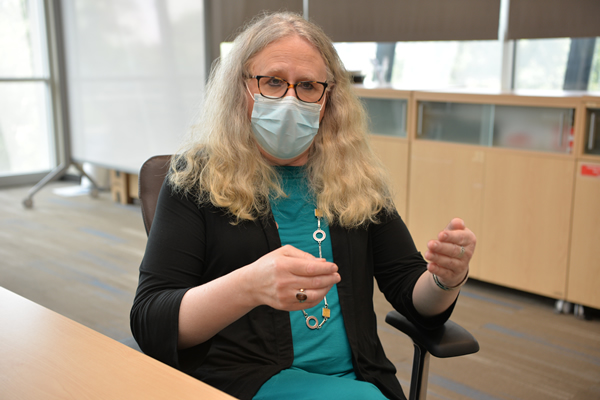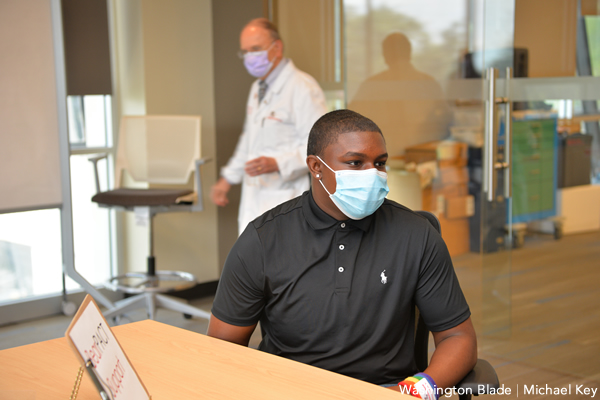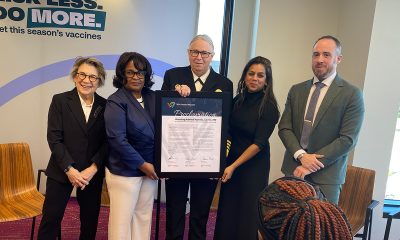National
Rachel Levine in ‘rewarding’ visit speaks with trans youth at D.C. health clinic
Hospital an oasis of support amid attacks from states

It’s not unusual for Rachel Levine as assistant secretary for health to visit medical facilities on behalf of the Department of Health & Human Services. But her visit last week to the LGBTQ youth clinic at the Children’s National Hospital was special because she was able to meet with transgender youth as an openly transgender presidential appointee.
The visit on Thursday by Levine at the D.C.-based hospital comes not long after the U.S. Senate approved her appointment, making her the first openly transgender presidential appointee to win a Senate-confirmed position. As such, her visit to the LGBTQ youth clinic, where transgender kids come for transition-related care and health services, held particular significance for the patients.
Levine, speaking with the Washington Blade at the end of her visit, said having the opportunity to speak with both transgender youth and medical professionals testing them was “tremendously, tremendously rewarding”
“It’s tremendously gratifying to be able to speak to the medical professionals and the clinic personnel, but particularly to the youth and their families from my experience,” Levine added. “So I have two aspects of that. One is that I’m a pediatrician and adolescent medicine specialist. So I’ve been teaching to children and their families my entire career, but the other is coming from my lived experience as an openly transgender woman, and so I find it tremendously rewarding.”
The warm environment of the hospital for children is readily apparent upon entering the main atrium of the building. Lights dressed up as hot air balloons fill the tall ceiling while a nearby TV shows music videos consisting of squares of kids’ faces singing, followed by easy-listening country music and Asian K-pop. Children and their parents await their appointments seated in comfy plush red chairs before white blocks meant for use as tables.
Key to Levine’s visit was taking part in a discussion at the hospital auditorium with three transgender youth and their families who obtain services at the clinic. During the question-and-answer period, Levine shared her experience as a transgender person who underwent transition later in life and went on to tremendous success as a high-ranking presidential appointee.
For the transgender youth, Levine’s presence at the hospital — at a time when state legislatures are busy enacting bills to restrict their access to medical care and school activities — serves as a reminder that barriers based on gender identity are breaking down and the sky’s the limit for their future.
After the question-and-answer session, Levine told the Blade she “learned a lot” about Children’s National, which she called “a world-renowned children’s hospital and academic medical center.”
“I’ve known about it before,” Levine added. “I’m a pediatrician, adolescent medicine specialist, but I learned more about what they’re doing. And I learned specifically about their gender clinic, where they take care of transgender and gender non-conforming youth and got to meet some of the staff as well as the kids and their families.”
The Youth Pride Clinic, which opened in 2015, is one of the few clinics in the nation to provide primary care and mental health services to LGBTQ youth from ages 12 to 22. Among the services offered are hormone replacement therapy, STP/STI treatment and PrEP services as well as individual and family therapy for transgender youth.
Among the transgender youth patients at the clinic who spoke to the Washington Blade was Amir, a 15-year-old Georgia native whose last name as a minor is being withheld for confidentiality purposes.
“I started out in fifth grade coming out as lesbian,” Amir said. “I didn’t even really know, but when I came out to my grandma in Georgia, where I’m from, I still didn’t feel like myself. So then, later on, me and my friend researched, and next thing you know we came across the term transgender, and I was like, ‘This is who I am. This is me.’”
Amir said he began taking shots as part of care regimen in January. Being able to receive care from the Youth Pride Clinic, Amir said, means a lot because he has an opportunity not available to other transgender youths, who face challenges and even hostility as they make the journey to transition. The staffers at the Youth Pride Clinic, Amir said, are “like a second family” who work hard to provide the services they offer.
Sonia Murphy, Amir’s aunt who became his legal guardian, said when she began reaching out for medical help for Amir she found a two- or three-year wait list to get access to treatment, which she said makes her “saddened” such care isn’t widely available.
“There’s a population of kids and parents out there who need the services and just can’t access it because there’s not enough bandwidth, not enough manpower,” Murphy said.
Amir said he’s getting other avenues of support from his two cousins, one who is older at age 18 and one who is younger at age 12. “They’re like sisters to me, so I call them my sisters,” Amir said. Amir also identified two other male cousins as well as his uncles and his aunt.
“They’re all very supportive of me,” Amir said. “My auntie Tonya, for example, Pride month came up, first day, she sent me a paragraph, saying, ‘I’m glad you’re yourself and you’re open to who you are and things like that,” and that I’m not afraid to be who I am around anybody. It’s just things like that. And for my birthday, I had tons of Pride shirts, and I got a rainbow shirt with the fist in the middle for Black Lives Matter, and it was a ton of different things.”
Lawrence D’Angelo, director of the Youth Pride Clinic and an occupational health adolescent medicine specialist, told the Blade being able to start the facility in 2015 in and of itself was one of the key victories for the initiative, although he said the Children’s National has been providing transition-related care since 1998.
“When we started it…we thought that we were going to be running a PrEP clinic, that we were going to be providing preventive services to LGBTQ kids,” D’Angelo said. “The first day, the first patient actually came in and asked for PrEP, and the other six patients that were scheduled that day all wanted transgender services. So, suddenly, it became obvious what we were going to be spending 90 percent of our time doing, which is exactly what we think we should be doing, because that’s where the need is the greatest.”
Despite the advantages of having access to the Youth Pride Clinic, transgender youth have clear challenges and face hostility based simply on their gender identity, especially in a year when state legislatures have in an unprecedented manner enacted legislation against them. The Youth Pride Clinic, in many ways, is an oasis of support.
Arkansas, for example, enacted a measure that would make criminal the kind of services provided at the clinic. Other states have enacted measures prohibiting “biological boys” from participating in sports, which essentially bars transgender girls from participating in sporting events.
While anti-trans measures aren’t being enacted in D.C. or any nearby states, the advancement of anti-trans legislation in states has had a negative effect on transgender patients at the Youth Pride Clinic.
D’Angelo, based on conversations he’s had with the patients, said they’re aware of the wave of legislation, which he said has led to fear, anger and being “unable to understand what is happening and why it’s happening.”
Amir said watching states enact legislation against transgender youth “makes me feel some type of weight,” pointing specifically to the anti-trans sports measures because he said he’d welcome the opportunity to participate in athletics.
“I’m athletic,” Amir said. “I do all types of sports. I play basketball, soccer, I’m going to do boxing…With sports and stuff, I just feel like I want to be able to do everything, just as a regular cisgender person will be able to do,”
Amir, despite the enactment of anti-trans laws, has an optimistic outlook and said the enactment of state measures against transgender youth demonstrates they’re now “on the radar” of the social conservative movement.
“I feel like if everybody who’s a part of LGBTQ and trans together, we can stand up and we can overcome this because the thing is, there are so many people out there who don’t understand what we do, and the thing is that they’re noticing us, so that’s a start to something big.”

With many states hostile to transgender youth, others are looking to the federal government for support under the Biden administration. On his first day in office, Biden signed an executive order directing federal agencies to implement the U.S. Supreme Court’s decision against anti-LGBTQ discrimination to the fullest extent possible.
Levine cited an announcement from HHS that resulted from this order on implementing regulations prohibiting anti-LGBTQ discrimination in medical care, reversing a policy under the Trump administration that green lighted discrimination, as one of the ways it has answered that call and helped families like the Youth Pride Clinic.
“So the Affordable Care Act says that you cannot discriminate based upon sex,” Levine said. “The Department Health & Human Services and the Office of Civil Rights has interpreted sex to include sexual and gender minorities, to include sexual orientation and gender identity, which means LGBTQ individuals under that. So we need to look at all aspects of the Affordable Care Act, and to work to implement that interpretation of the statute. That was only done a month or so ago, so we’re going to be working on that now.”
Is there anything more the federal government can do to support the clinic? D’Angelo cited a number of key things already secured, including the hospital being able to offer insurance to patients and the affirmation from HHS against anti-LGBTQ discrimination. More research dollars and greater focus from the National Institutes of Health on gender diverse and sexual minority individuals, D’Angelo said, would also be welcome.
“There are things out there that the federal government can do, but I think…there are limitations of what they can do,” D’Angelo said. “They can’t, unfortunately, effect what’s going on in individual states, which is, in some cases draconian. That’s an awful thought if we were practicing medicine in Arkansas, we could be in jail.”
Meanwhile, Levine said the Biden administration, including Secretary of Health & Human Services Xavier Becerra, is working on both internal and external policies to facilities like the Youth Pride Clinic to help them secure their place in the health system and reach transgender youth.
“The secretary and I will be doing everything we can to advocate for the LGBTQ community,” Levine said. “So I think we’re going to be working externally, in terms of advocacy, and then we’re going to be working internally in terms of policy.”
U.S. Supreme Court
Supreme Court to consider bans on trans athletes in school sports
27 states have passed laws limiting participation in athletics programs

The U.S. Supreme Court on Thursday agreed to hear two cases involving transgender youth challenging bans prohibiting them from participating in school sports.
In Little v. Hecox, plaintiffs represented by the ACLU, Legal Voice, and the law firm Cooley are challenging Idaho’s 2020 ban, which requires sex testing to adjudicate questions of an athlete’s eligibility.
The 9th U.S. Circuit Court of Appeals described the process in a 2023 decision halting the policy’s enforcement pending an outcome in the litigation. The “sex dispute verification process, whereby any individual can ‘dispute’ the sex of any female student athlete in the state of Idaho,” the court wrote, would “require her to undergo intrusive medical procedures to verify her sex, including gynecological exams.”
In West Virginia v. B.P.J., Lambda Legal, the ACLU, the ACLU of West Virginia, and Cooley are representing a trans middle school student challenging the Mountain State’s 2021 ban on trans athletes.
The plaintiff was participating in cross country when the law was passed, taking puberty blockers that would have significantly reduced the chances that she could have a physiological advantage over cisgender peers.
“Like any other educational program, school athletic programs should be accessible for everyone regardless of their sex or transgender status,” said Joshua Block, senior counsel for the ACLU’s LGBTQ and HIV Project. “Trans kids play sports for the same reasons their peers do — to learn perseverance, dedication, teamwork, and to simply have fun with their friends,” Block said.
He added, “Categorically excluding kids from school sports just because they are transgender will only make our schools less safe and more hurtful places for all youth. We believe the lower courts were right to block these discriminatory laws, and we will continue to defend the freedom of all kids to play.”
“Our client just wants to play sports with her friends and peers,” said Lambda Legal Senior Counsel Tara Borelli. “Everyone understands the value of participating in team athletics, for fitness, leadership, socialization, and myriad other benefits.”
Borelli continued, “The U.S. Court of Appeals for the Fourth Circuit last April issued a thoughtful and thorough ruling allowing B.P.J. to continue participating in track events. That well-reasoned decision should stand the test of time, and we stand ready to defend it.”
Shortly after taking control of both legislative chambers, Republican members of Congress tried — unsuccessfully — to pass a national ban like those now enforced in 27 states since 2020.
Federal Government
UPenn erases Lia Thomas’s records as part of settlement with White House
University agreed to ban trans women from women’s sports teams

In a settlement with the Trump-Vance administration announced on Tuesday, the University of Pennsylvania will ban transgender athletes from competing and erase swimming records set by transgender former student Lia Thomas.
The U.S. Department of Education’s Office for Civil Rights found the university in violation of Title IX, the federal rights law barring sex based discrimination in educational institutions, by “permitting males to compete in women’s intercollegiate athletics and to occupy women-only intimate facilities.”
The statement issued by University of Pennsylvania President J. Larry Jameson highlighted how the law’s interpretation was changed substantially under President Donald Trump’s second term.
“The Department of Education OCR investigated the participation of one transgender athlete on the women’s swimming team three years ago, during the 2021-2022 swim season,” he wrote. “At that time, Penn was in compliance with NCAA eligibility rules and Title IX as then interpreted.”
Jameson continued, “Penn has always followed — and continues to follow — Title IX and the applicable policy of the NCAA regarding transgender athletes. NCAA eligibility rules changed in February 2025 with Executive Orders 14168 and 14201 and Penn will continue to adhere to these new rules.”
Writing that “we acknowledge that some student-athletes were disadvantaged by these rules” in place while Thomas was allowed to compete, the university president added, “We recognize this and will apologize to those who experienced a competitive disadvantage or experienced anxiety because of the policies in effect at the time.”
“Today’s resolution agreement with UPenn is yet another example of the Trump effect in action,” Education Secretary Linda McMahon said in a statement. “Thanks to the leadership of President Trump, UPenn has agreed both to apologize for its past Title IX violations and to ensure that women’s sports are protected at the university for future generations of female athletes.”
Under former President Joe Biden, the department’s Office of Civil Rights sought to protect against anti-LGBTQ discrimination in education, bringing investigations and enforcement actions in cases where school officials might, for example, require trans students to use restrooms and facilities consistent with their birth sex or fail to respond to peer harassment over their gender identity.
Much of the legal reasoning behind the Biden-Harris administration’s positions extended from the 2020 U.S. Supreme Court case Bostock v. Clayton County, which found that sex-based discrimination includes that which is based on sexual orientation or gender identity under Title VII rules covering employment practices.
The Trump-Vance administration last week put the state of California on notice that its trans athlete policies were, or once were, in violation of Title IX, which comes amid the ongoing battle with Maine over the same issue.
New York
Two teens shot steps from Stonewall Inn after NYC Pride parade
One of the victims remains in critical condition

On Sunday night, following the annual NYC Pride March, two girls were shot in Sheridan Square, feet away from the historic Stonewall Inn.
According to an NYPD report, the two girls, aged 16 and 17, were shot around 10:15 p.m. as Pride festivities began to wind down. The 16-year-old was struck in the head and, according to police sources, is said to be in critical condition, while the 17-year-old was said to be in stable condition.
The Washington Blade confirmed with the NYPD the details from the police reports and learned no arrests had been made as of noon Monday.
The shooting took place in the Greenwich Village neighborhood of Manhattan, mere feet away from the most famous gay bar in the city — if not the world — the Stonewall Inn. Earlier that day, hundreds of thousands of people marched down Christopher Street to celebrate 55 years of LGBTQ people standing up for their rights.
In June 1969, after police raided the Stonewall Inn, members of the LGBTQ community pushed back, sparking what became known as the Stonewall riots. Over the course of two days, LGBTQ New Yorkers protested the discriminatory policing of queer spaces across the city and mobilized to speak out — and throw bottles if need be — at officers attempting to suppress their existence.
The following year, LGBTQ people returned to the Stonewall Inn and marched through the same streets where queer New Yorkers had been arrested, marking the first “Gay Pride March” in history and declaring that LGBTQ people were not going anywhere.
New York State Assemblywoman Deborah Glick, whose district includes Greenwich Village, took to social media to comment on the shooting.
“After decades of peaceful Pride celebrations — this year gun fire and two people shot near the Stonewall Inn is a reminder that gun violence is everywhere,” the lesbian lawmaker said on X. “Guns are a problem despite the NRA BS.”
-

 U.S. Supreme Court3 days ago
U.S. Supreme Court3 days agoSupreme Court to consider bans on trans athletes in school sports
-

 Out & About3 days ago
Out & About3 days agoCelebrate the Fourth of July the gay way!
-

 Virginia3 days ago
Virginia3 days agoVa. court allows conversion therapy despite law banning it
-

 Maryland5 days ago
Maryland5 days agoLGBTQ suicide prevention hotline option is going away. Here’s where else to go in Md.












